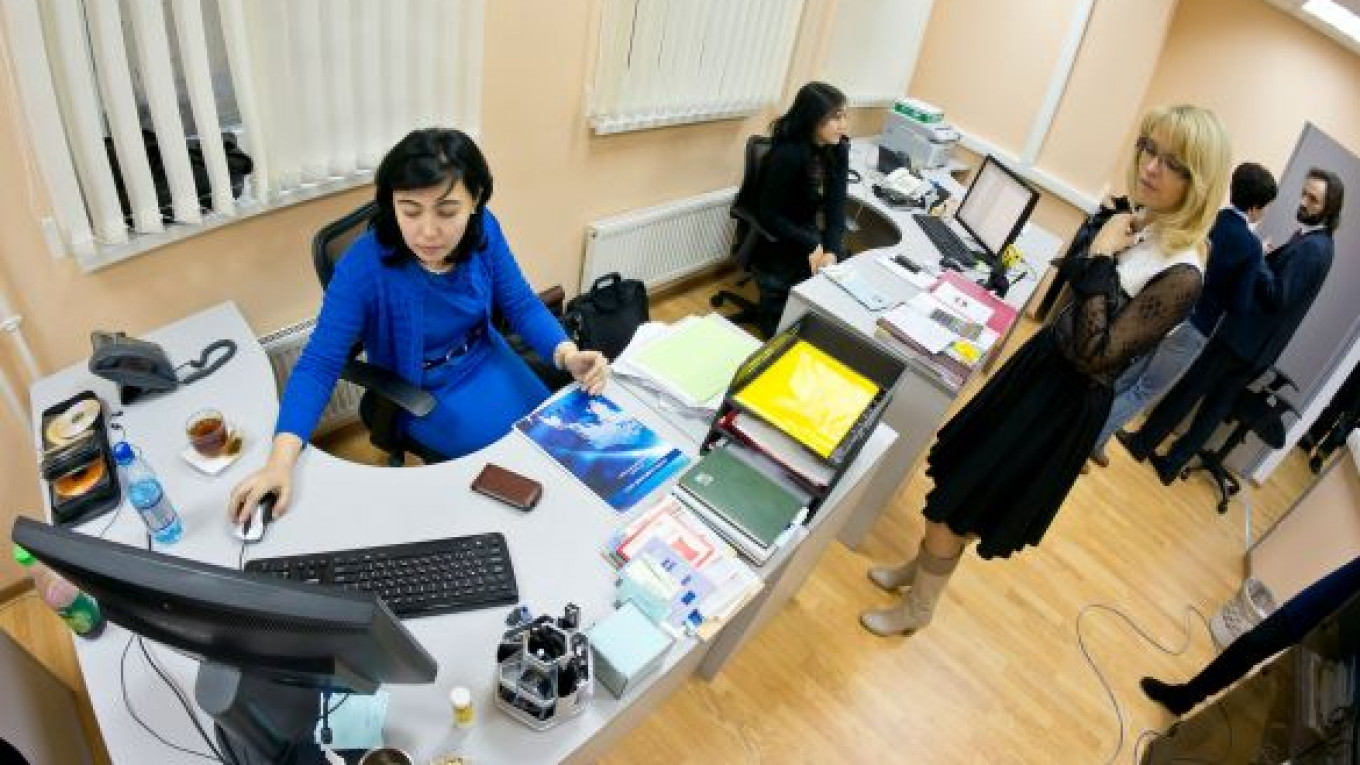Russia’s largest association of migrants opened an “adaptation center” in Moscow on Monday that will help workers from other countries learn Russian, obtain professional training and get medical insurance and bank loans.
The center will help to fulfill goals set by President Vladimir Putin in late August to “secure the successful integration and adaptation” of migrants in Russia, which roughly corresponds to one of the goals of the state migration policy to 2025 that he approved in June.
It will also assist migrants in meeting the requirements of a law that introduces mandatory Russian-language tests from Dec. 1 for migrants who work in certain spheres.
The Multifunctional Migrant Adaptation Center opened with the backing of the Russian Migrants Federation in a rented building on Nizhny Kiselny Pereulok, near metro station Trubnaya in downtown Moscow.
Federation head Madzhumder Mukhammad Amin greeted several dozen guests, including municipal and federal officials, heads of , and reporters, at a long table in a room of the newly renovated building.
“We are addressing you to jointly fulfill the for us by the president,” Amin told the guests, including representatives of the Federal Migration Service, the Regional Development Ministry, the Moscow City Duma, and a representative of the United Nations Refugee Agency, among others.
“Within the framework [of the to 2025] we must work together to achieve a civilized society,” Amin told the guests.
Some rooms in the building were still under repair and workers were seen moving around in the corridors. During a coffee break at the opening ceremony, guests were treated to vodka, champagne, wine, red caviar, pies and pastries.
Rental costs and repairs to the building were financed by business people from the International Labor Alliance, as well as by the Afghan, Uzbek, Pakistani and Kyrgyz diasporas in Moscow, among other groups, Amin told the guests. But state aid would be needed for a “large-scale implementation” of the center’s activities, he said.
Immigration is a lightning-rod issue in Russia, which has millions of illegal, low-skilled workers from former Soviet republics who boost crime rates and breed social tensions, but who also serve as major sources of cheap labor for industries like construction and cleaning services.
The current in Russia stands at about 3.5 million people but the figure fluctuates from 3 to 5 million at various times, deputy head of the Federal Migration Service Yekaterina Yegorova said last month, RIA-Novosti reported.
Foreigners, predominantly migrant workers, were responsible for 48 percent of all crime, including 70 percent of murders, since the start of the year, Moscow police chief Anatoly Yakunin said in early November.
In June, Putin said current legislation was aimed largely at attracting workers and not at helping to educate them and integrate them into Russian society.
Vladimir Volokh, head of the Federal Migration Service’s public council, concurred with that opinion, telling the guests at the new center Monday that “little had been done for the adaptation and integration of migrants” before the creation of the migration policy to 2025, which he called “a big stimulus.”
UN Refugee Agency representative in Russia Geshe Karrenbrock called the policy plan a “milestone.” But she also stressed “the importance of the influence of civil society.”
The center will offer courses in Russian language and culture, run a hotline for complaints from migrants, provide legal consultations for employers who hire migrants and render various kinds of assistance to families of mixed nationality.
Information services and consultations will be free for migrants and paid for employers.
More than 70 offices teaching Russian language and culture to migrants will open by late 2013, Amin said. The 110 hours of studies to get a state diploma may cost about 15,000 rubles ($475), he said.
In late October, the Federation Council passed a bill that would introduce compulsory Russian-language tests from Dec. 1 for foreigners working in residential housing and utilities, and retail and services.
The center will also sign contracts with a number of universities, banks and insurance companies to provide services for migrants through the center.
Universities will offer courses through the center to help improve migrants’ qualifications in fields from construction to journalism, while banks will offer loans and insurance companies will provide medical policies. The center will also hold seminars with the participation of migration officials.
The federation has also formed a group of 20 young volunteers from foreign diasporas in Moscow and Russian youths who will greet migrants at train stations and airports to explain behavioral norms in Moscow, Amin said. These range from the practical — how to use public transportation, how to use a cell phone — to the controversial, such as “not talking loudly in your own language” and wearing “standard European clothes.”
The volunteers, whose number will grow to 300 by late 2013, will wear smocks reading “Welcome to Moscow!” Amin said, putting one on himself.
Related articles:
A Message from The Moscow Times:
Dear readers,
We are facing unprecedented challenges. Russia's Prosecutor General's Office has designated The Moscow Times as an "undesirable" organization, criminalizing our work and putting our staff at risk of prosecution. This follows our earlier unjust labeling as a "foreign agent."
These actions are direct attempts to silence independent journalism in Russia. The authorities claim our work "discredits the decisions of the Russian leadership." We see things differently: we strive to provide accurate, unbiased reporting on Russia.
We, the journalists of The Moscow Times, refuse to be silenced. But to continue our work, we need your help.
Your support, no matter how small, makes a world of difference. If you can, please support us monthly starting from just $2. It's quick to set up, and every contribution makes a significant impact.
By supporting The Moscow Times, you're defending open, independent journalism in the face of repression. Thank you for standing with us.
Remind me later.


